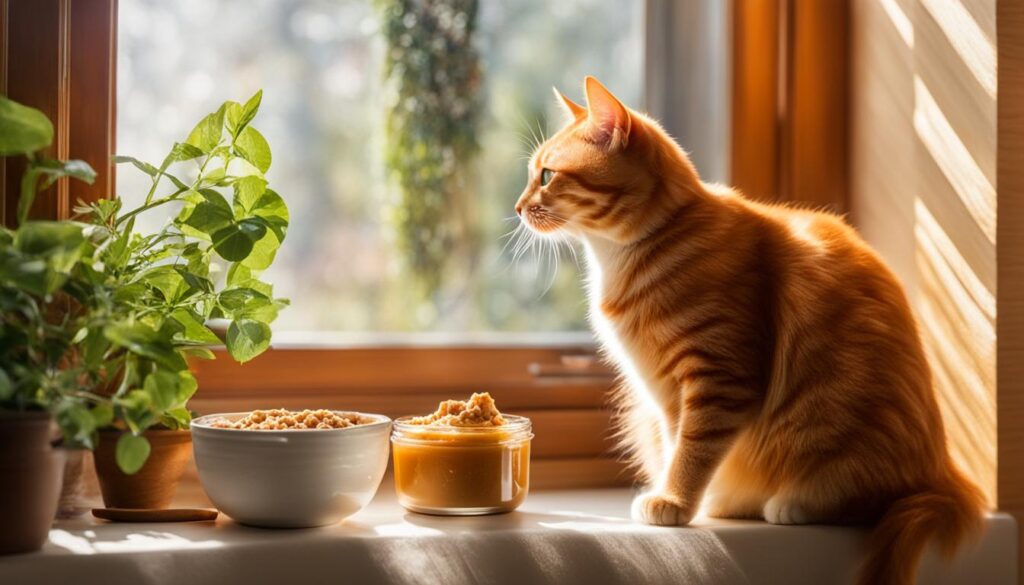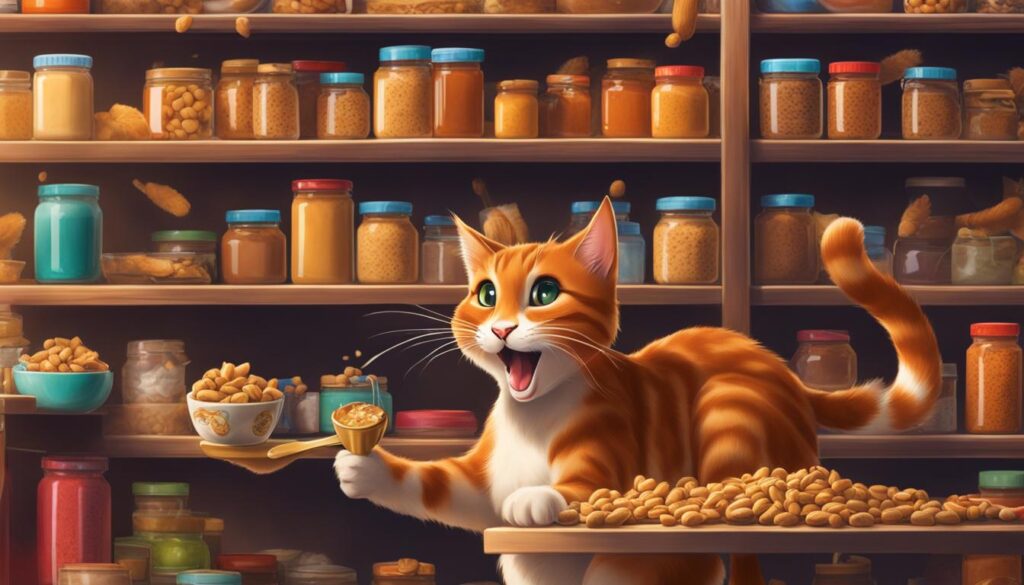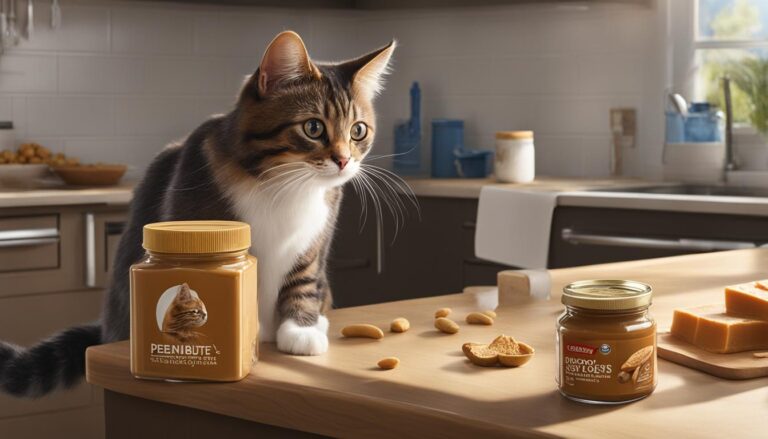Are you a cat owner curious about whether it’s safe for your feline friend to indulge in some peanut butter? While the sight of a cat licking a spoonful of this creamy treat is undeniably adorable, it’s important to understand the potential risks and side effects.
According to the American Society for the Prevention of Cruelty to Animals, cats are “obligate carnivores” and their diet should primarily consist of meat. As such, peanut butter provides no nutritional value for them and should not be a regular part of their diet. However, if you’re considering offering your cat a taste of peanut butter, it’s crucial to proceed with caution and take certain factors into consideration.
重要なポイント
- Cats are obligate carnivores, so their diet should primarily consist of meat.
- While cats can technically eat peanut butter, it is not recommended as it provides no nutritional benefits.
- Peanut butter can pose risks to a cat’s health due to ingredients like xylitol, which is toxic to animals, and high levels of fats, sugars, and sodium.
- Feeding peanut butter to cats should be done carefully, following the advice of a veterinarian and considering the nutrition label to avoid harmful additives.
- There are alternative treats and foods that can provide nutritional benefits for cats while aligning with their natural dietary needs.
Is Peanut Butter Safe for Cats?
Peanut butter is a popular treat enjoyed by many humans, but is it safe for cats? While cats can technically eat peanut butter, it is not considered safe for them. Cats are obligate carnivores, meaning their diet should primarily consist of meat. Peanut butter provides no nutritional benefits to cats and can lead to gastrointestinal issues due to its high fat and sugar content. Some peanut butters even contain harmful additives like xylitol, which is toxic to animals. It is important to read the nutrition label and avoid peanut butters with these harmful ingredients.
If you are considering feeding peanut butter to your cat, it is recommended to consult with a veterinarian first. They can provide guidance on whether peanut butter is appropriate for your cat’s diet and recommend the right amount and type of peanut butter to give. It is also important to remember that serving sizes for cats are much smaller than for humans, and it is recommended to only offer a small lick or portion of peanut butter. Additionally, kittens should generally avoid peanut butter due to their delicate digestive systems.
Is Peanut Butter Safe for Cats?
In conclusion, while cats can technically consume peanut butter, it is not recommended due to the lack of nutritional benefits and potential risks. Feeding peanut butter to cats can lead to gastrointestinal issues, allergic reactions, weight gain, and the ingestion of harmful additives. It is best to stick to a cat’s natural diet of meat and select treats specifically formulated for felines. Always prioritize the health and well-being of your cat when considering their diet and treat options.
Potential Risks of Feeding Cats Peanut Butter
Feeding peanut butter to cats can pose several risks. Cats may experience gastrointestinal upset, including vomiting, diarrhea, and gas, when consuming peanut butter due to its non-digestible nature for felines. Cats can also be allergic to peanuts and may experience symptoms such as itchy skin rash, ear infections, or even anaphylaxis. Certain ingredients in peanut butter, like xylitol and chemical preservatives, can be toxic to cats. The high calorie and fat content of peanut butter can contribute to weight gain and increase the risk of conditions such as diabetes and heart disease. It is important to monitor your cat closely for any negative reactions or symptoms after feeding them peanut butter.
“Feeding peanut butter to cats can lead to gastrointestinal upset, allergic reactions, and other health risks.”
Peanut butter can cause gastrointestinal upset and allergic reactions in cats. Cats may experience vomiting, diarrhea, and gas, and could develop itchy skin rash, ear infections, or even anaphylaxis. Certain ingredients in peanut butter, like xylitol and chemical preservatives, are toxic to cats. The high calorie and fat content of peanut butter can contribute to weight gain, diabetes, and heart disease.
When feeding peanut butter to your cat, it is crucial to observe their response and be aware of any negative side effects. If you notice any adverse reactions, discontinue feeding peanut butter and consult with a veterinarian. It is always better to prioritize your cat’s health and well-being by providing them with a balanced and appropriate diet.
| Risks of Feeding Cats Peanut Butter | Signs and Symptoms |
|---|---|
| Gastrointestinal upset | Vomiting, diarrhea, gas |
| Allergic reaction | Itchy skin rash, ear infections, anaphylaxis |
| Toxic ingredients | Xylitol, chemical preservatives |
| Weight gain | Increased risk of diabetes and heart disease |
“Feeding peanut butter to your cat can lead to gastrointestinal upset, allergic reactions, and toxic effects due to certain ingredients. It can also contribute to weight gain and increase the risk of diabetes and heart disease.”
Considering these potential risks, it is generally advisable to avoid feeding peanut butter to cats and opt for alternative treats and foods that align with their dietary needs and provide necessary nutrition. Your cat’s health should always be the top priority.
How to Safely Feed Your Cat Peanut Butter
If you choose to feed peanut butter to your cat, it is important to do so safely. While peanut butter is not recommended for their diet, if given in small amounts and following certain guidelines, it can be a treat for your feline friend. Here are some tips on how to safely feed your cat peanut butter:
Choose Cat-Friendly Peanut Butter Brands
Look for cat-friendly peanut butter brands that do not contain harmful additives like xylitol, excessive sodium, or high levels of fats and sugars. Read the nutrition label carefully to ensure the peanut butter is safe for your cat to consume.
Stick to Small Amounts
Cats should only be given a small lick or portion of peanut butter as a treat. Serving sizes for cats are much smaller than for humans, and excessive amounts of peanut butter can lead to digestive issues or weight gain. Monitor your cat’s reaction and adjust the portion accordingly.
Monitor Your Cat’s Reaction
After giving your cat peanut butter, observe their behavior and any physical reactions. If your cat shows signs of gastrointestinal upset, such as vomiting or diarrhea, discontinue feeding them peanut butter. If you notice any other negative symptoms or allergies, consult with your veterinarian.
Remember that peanut butter should not be a regular part of your cat’s diet and should only be given occasionally as a treat. Prioritize their nutritional needs with a balanced diet tailored to their specific requirements. Always consult with your veterinarian before introducing any new foods or treats to your cat’s diet.

Alternatives to Peanut Butter for Cats
If you’re looking for alternatives to peanut butter that are safe and beneficial for your feline friend, there are several options to consider. These alternatives can provide your cat with the flavors they enjoy while providing nutritional benefits.
Meat-based treats and cat foods:
Cats are obligate carnivores, meaning their diet should primarily consist of meat. There are many meat-based treats and cat foods available that are specifically formulated to meet their dietary needs. These options not only provide essential nutrients but also align with a cat’s natural diet.
Boiled eggs, chicken, and fish:
If you’re looking for homemade treats, boiled eggs, boiled chicken, and fish can be offered in small portions. These protein-rich options can provide a tasty alternative to peanut butter and offer a variety of flavors for your cat to enjoy.
Fruits, vegetables, and rice:
In moderation, fruits and vegetables such as cantaloupe, pumpkin, bananas, apples, spinach, blueberries, strawberries, and carrots can be given as treats. These options provide different flavors and nutrients that can be beneficial for cats. Additionally, rice can be offered as a source of carbohydrates for a balanced diet.
Remember to introduce new treats gradually and monitor your cat’s reaction to ensure they are well-tolerated. Consulting with your veterinarian is always recommended to ensure the treats you choose are appropriate for your cat’s specific dietary needs and health conditions.
| Treat | Nutritional Benefits |
|---|---|
| Meat-based treats and cat foods | Provide essential nutrients and align with a cat’s natural diet |
| Boiled eggs, chicken, and fish | Rich in protein and offer a variety of flavors |
| Fruits and vegetables (in moderation) | Offer different flavors and provide beneficial nutrients |
| Rice | Source of carbohydrates for a balanced diet |
General Guidelines for Feeding Your Cat Treats
When it comes to treating your cat, including the occasional indulgence of peanut butter, it’s important to keep a few general guidelines in mind. By following these tips, you can ensure that your cat stays safe and healthy while enjoying their favorite snacks.
1. Treats Should Be a Small Part of Their Diet
While treats can be a great way to show your cat some love, keep in mind that they should make up no more than 10% of their daily caloric intake. The majority of their nutrients should come from their regular cat food, which is specifically formulated to meet their dietary needs. Treating your cat too often or with large quantities of treats can lead to weight gain and other health issues.
2. Consult with Your Veterinarian
Before introducing any new treats or foods to your cat’s diet, it’s always a good idea to consult with your veterinarian. They can provide personalized advice based on your cat’s specific needs and health conditions. They can also recommend cat-friendly peanut butter brands or advise if peanut butter is suitable for your cat at all.
3. Monitor Your Cat’s Reaction
When you give your cat peanut butter or any other treats, it’s essential to monitor their reaction. If you notice any signs of gastrointestinal upset, such as vomiting, diarrhea, or gas, it may be a sign that the treat is not agreeing with them. All cats are different, so what works for one may not work for another. It’s always better to be safe than sorry, so keep a close eye on your cat’s well-being.
4. Be Mindful of Ingredients
When selecting treats, including peanut butter, for your cat, be sure to read the nutrition labels. Look for cat-friendly peanut butter brands that do not contain harmful additives like xylitol, excessive sodium, or high levels of fats and sugars. Remember, cats have different dietary requirements than humans, so what may be safe for us may not be suitable for them.
5. Introduce Treats Gradually
If you’re introducing a new treat, including peanut butter, to your cat, it’s best to do so gradually. Start with a small amount and observe how your cat reacts. If there are no adverse effects, you can continue to offer the treat in moderation. However, if your cat shows signs of discomfort or negative reactions, it’s best to discontinue the treat and consult with your veterinarian for further guidance.

| Treat Guidelines | Your Cat’s Well-being |
|---|---|
| Limit treats to 10% of their daily caloric intake | Prevents weight gain and ensures a balanced diet |
| Consult with your veterinarian | Personalized advice based on your cat’s needs and health conditions |
| Monitor your cat’s reaction | Identify any allergies or digestive issues |
| Choose treats with cat-friendly ingredients | Avoid harmful additives and excessive fats and sugars |
| Introduce treats gradually | Ensure your cat tolerates the treats well |
Remember, every cat is unique, and their dietary needs may vary. It’s always important to prioritize your cat’s health and well-being when considering their treats. By following these general guidelines and consulting with your veterinarian, you can make informed decisions about treating your feline friend, including whether or not peanut butter is suitable for them.
Can Cats Eat Peanut Butter? A Summary
While cats can technically eat peanut butter, it is not recommended for their diet due to the lack of nutritional benefits and potential risks involved. Feeding peanut butter to cats can lead to gastrointestinal issues, allergic reactions, weight gain, and other health problems. It is best to stick to a cat’s natural diet of meat and select treats specifically formulated for felines. It is important to consult with a veterinarian before introducing new foods or treats to your cat and to always read nutrition labels to avoid harmful additives.
According to the American Society for the Prevention of Cruelty to Animals, cats are “obligate carnivores” and their diet should primarily consist of meat. Peanut butter provides no nutritional value for cats and can pose risks to their health due to ingredients such as xylitol, which is toxic to animals, and high levels of fats, sugars, and sodium. Feeding peanut butter to cats should be done carefully, following the advice of a veterinarian and considering the nutrition label to avoid harmful additives.
Feeding peanut butter to cats can pose several risks. Cats may experience gastrointestinal upset, including vomiting, diarrhea, and gas, when consuming peanut butter due to its non-digestible nature for felines. Cats can also be allergic to peanuts and may experience symptoms such as itchy skin rash, ear infections, or even anaphylaxis. Certain ingredients in peanut butter, like xylitol and chemical preservatives, can be toxic to cats. The high calorie and fat content of peanut butter can contribute to weight gain and increase the risk of conditions such as diabetes and heart disease. It is important to monitor your cat closely for any negative reactions or symptoms after feeding them peanut butter.
| Can Cats Eat Peanut Butter? | 概要 |
|---|---|
| Is it safe for cats to eat peanut butter? | No, it is not recommended due to lack of nutritional benefits and potential risks. |
| Is peanut butter harmful to cats? | Yes, it can lead to gastrointestinal issues, allergic reactions, weight gain, and other health problems. |
| What are the side effects of cats eating peanut butter? | Gastrointestinal upset, allergic reactions, and increased risk of weight gain and health issues. |
If you choose to feed peanut butter to your cat, it should be done sparingly and with the approval and guidance of a veterinarian. There are alternative treats and foods that can provide nutritional benefits for cats while aligning with their natural dietary needs. Always prioritize the health and well-being of your cat when considering their diet and treat options.
Remember: While peanut butter may be a tempting treat for cats, it is best to avoid feeding them this food. Cats are obligate carnivores, and their diet should primarily consist of meat. Stick to treats specifically formulated for cats and consult with a veterinarian for personalized advice on your cat’s diet.
結論
While peanut butter may be a tempting treat for cats, it’s best to avoid feeding them this food. Cats are obligate carnivores, and their diet should primarily consist of meat. Peanut butter provides no nutritional value for cats and can pose risks to their health, including gastrointestinal issues, allergic reactions, weight gain, and the ingestion of harmful additives.
If you choose to feed peanut butter to your cat, it should be done sparingly and with the approval and guidance of a veterinarian. It’s important to consult with your vet before introducing new foods or treats to your cat’s diet and always read nutrition labels to avoid harmful additives.
Instead of peanut butter, there are alternative treats and foods that can provide nutritional benefits for cats while aligning with their natural dietary needs. Meat-based treats, boiled eggs, boiled chicken, fish, and a variety of fruits and vegetables can be offered in moderation. These alternatives offer different flavors and nutrients that can be beneficial for cats.
Always prioritize the health and well-being of your cat when considering their diet and treat options. By providing a balanced and appropriate diet, you can ensure that your feline friend stays healthy and happy.




